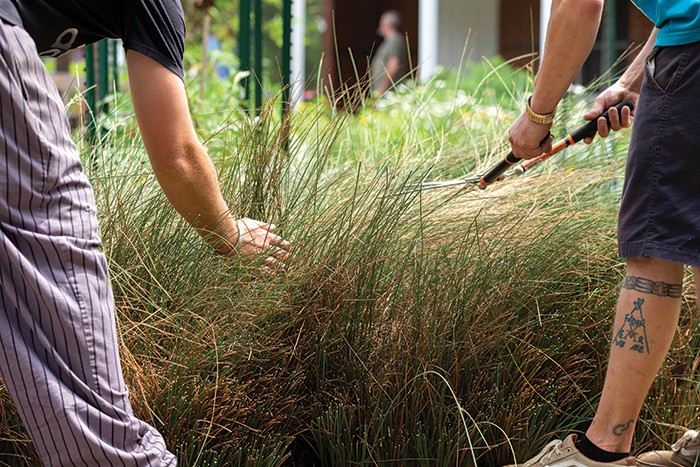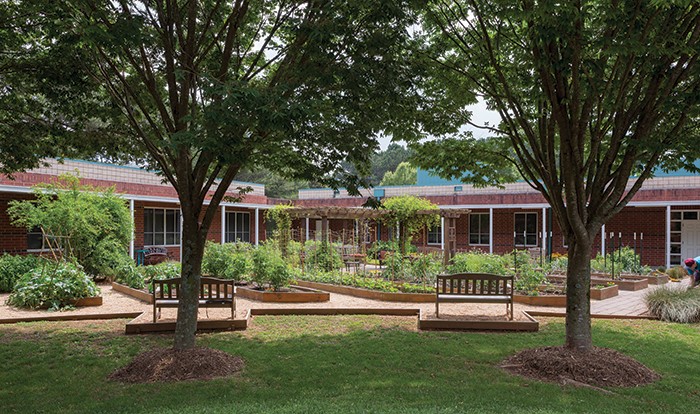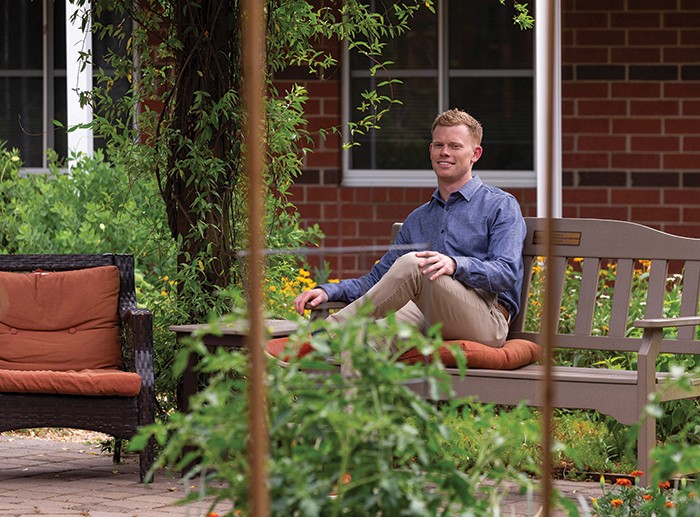Justin Garrity wants people to know that addiction can happen to anyone, and he’s proof.
Garrity grew up in Cary’s MacGregor neighborhood in a loving, affluent family. He’s the first to say he had everything he needed growing up, and there was no family history of addiction.
Starting at 3 p.m. Saturday, Dec. 21, Jon Frey will run for 24 continuous hours at the Historic Oakwood Cemetery to raise money for Healing Transitions. His goal is to raise more than $100,000. There will be delicious food, music and entertainment for everyone, and members of the community are encouraged to come out and support Jon as he runs! For more information or to donate, please visit: https://healing-transitions.org/oakwood24/.
He partied some in high school and more in college. Experimentation with drugs led to stronger drugs — and eventually a heroin addiction. He left college and was soon homeless, living out of his car.
Garrity also wants people to know that there’s help available.
“I didn’t know at the time what to do, or where to turn, but I went home one day, and my mom said to me, ‘We need to find help,’” Garrity said. “She did some research, and we found what was then called The Healing Place.”
The Healing Place of Raleigh, now called Healing Transitions, offers peer-to-peer, recovery-oriented services to homeless, uninsured and underserved individuals with alcoholism and drug addiction. The nonprofit offers its services at no cost.

The program at Healing Transitions is free. However, participants are expected to work at the facility. Some clients work in the facility’s gardens, where produce is grown to feed residents.
Healing Transitions originated in the mid-1990s as homelessness was on the rise in Wake County. A task force assembled to examine the problem found that on any given night, 1,900 individuals were homeless, and of those, two-thirds had an alcohol or drug problem, said Chris Budnick, executive director of the Raleigh-based nonprofit.
At the time, shelters turned away people who were under the influence of alcohol or drugs. That meant first responders often had to deal with individuals who were on the street and intoxicated.
That same task force recommended that a non-medical detox center be established. The facility would have no doctors or nurses on staff, but would be a place to sober up and go through withdrawal without medication to alleviate symptoms. Instead, staff would be trained to assess risk and potential for overdose, and to make referrals if a higher level of care were needed.
Through private funding and support from Wake County agencies, Healing Transitions opened and grew, adding a men’s campus in 2001 and a women’s campus in 2006.
“Services are on demand, 24/7, whenever someone asks for help or someone brings somebody in,” Budnick said. “We believe access is key to making sure they get the right help.
“With the opioid crisis right now, there may not be a second chance to pursue recovery.”

The garden at Healing Transitions’ men’s campus is the result of a partnership with the nonprofit, its clients and the Raleigh Master Gardeners. There is a similar garden at the women’s campus.
Healing Transitions offers services including a long-term residential recovery program, a non-medical detox, a support program for families of those who are facing addiction, and overnight ‘wet’ shelters on both the men’s and women’s campuses. Wet shelters welcome those who are under the influence of alcohol or drugs and need a place to stay.
Two-thirds of the Healing Transitions staff are former participants, so those in recovery interact with someone who’s experienced what they’re going through, Budnick says.
“They see someone in recovery, and they see a different possibility of a future for themselves,” he said.
Healing Transitions, which has space for 300 residents, has been operating at over capacity, says executive director Chris Budnick. Over the next several years, an $11.75 million capital campaign will provide more than 200 additional beds, expand the spaces for recovery programming, and add a new community and career center space.
Internally, there’s a message of community and responsibility as well. Those in the later stages of the recovery program are given jobs on campus. Peers can nominate each other for leadership opportunities, instilling a sense of confidence and self-worth, Budnick says. They give back as well, mentoring within the program, and participating in unique partnerships such as that with the Raleigh Master Gardeners. Program participants work side-by-side with master gardeners on each campus, where vegetables are grown to feed those in the program.
“This adds a sense of community impact and contributing to the welfare of those being served,” Budnick said.
Over the years, the nonprofit’s client population has changed and grown. Since 2001, the total number of individuals served by Healing Transitions has increased by 110 percent, Budnick says. That’s driven partly by population increase. Budnick says Wake County’s population has grown by 66% since they opened the men’s campus in 2001. The other driving factor is the opioid epidemic, which has caused more people to seek help. These new clients are also younger than those seen in the nonprofit’s early days.
They hope to never turn anyone away, because it presents both a public safety dilemma and because that person could overdose before they’re able to return, Budnick says.
And it’s not a ‘one-and-done’ program. Garrity can speak to that. His first experience with Healing Transitions was a 90-day recovery program. After he left, he found drugs again and ended up in jail. That wake-up call sent him back to Healing Transitions, staying 14 months in their residential program.
“When I came back, they graciously welcomed me with open arms again,” he said. “Otherwise, I don’t know where I’d be right now.”
Today, he’s one of their success stories. Garrity serves as the program’s Rapid Response program manager coordinating with Wake County EMS Advanced Practice paramedics to send someone who has experienced addiction out in the field with paramedics to visit people who have overdosed the previous day.
“We try to build a relationship with these folks, then link them to care or help them as best we can,” Garrity said.
How to help
Healing Transitions welcomes support via their website, mail or phone, and through partnerships such as Amazon Smile. Details are at healing-transitions.org/donate.
- Conniption Gin Rosé Spritz from Durham Distillery
- Hell Yes Ma’am Belgian Golden Ale from Raleigh Brewing Company
- Restaurant Profile: Scratch Kitchen & Taproom
- Think Outside the (Lunch) Box
- Cary’s Crepe Queen
- Flame and Fortune
- Fire and Service
- Nonprofit Spotlight: Healing Transitions
- Small Business Spotlight: Chatham Street Wine Market
- Ironweed: Purple Reign
- Notable Teens: Young Women to Watch
- Floating Away the Summer
- Restaurant Profile: Vicious Fishes Brewery, Tap and Kitchen
- Meet Lindsey Evans
- From the Editor: August 2019







This is a wonderful program!! I do; however, wish u had a wing that would accept ppl struggling w addiction that are on another program ( i.e., methadone maintenance or pain managment). Some have such severe pain, on a daily basis, that medication under strict supervision is required. It’s sad that this population is under served. I pray u will expand to serve that population, as well, in the future. Great job, tho!!